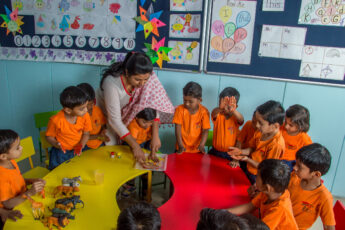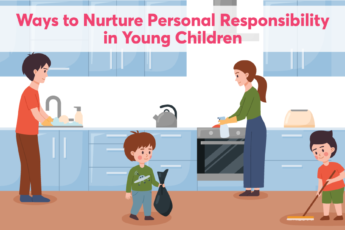How Interpersonal Skills Benefit Students in School and Beyond
Growing children have a lot to learn, and their first step to learning is observation. They take in the minute details of how their parents, and others around them behave, talk, and mimic their mannerisms. While this is a known fact, parents try to imbibe age-appropriate skills among their children. If you have a toddler at home to train, scroll for tips and benefits of interpersonal skills that come in handy for children of all ages.
Interpersonal skills build the foundation of one’s personality, and that makes it imperative for us to start training our children at the right age. When children meet their peers and interact with people outside of their core family is when parents can judge their interpersonal skills. Some children may be shy and need some guidance to go about this skill but some may be natural at it.
🌟Benefits of Interpersonal Skills among Children
1. Boosts confidence
Children with good interpersonal skills find it easy to interact with peers and individuals older than them. This not only boosts their confidence to be themselves and speak their mind but also helps them believe in themselves and stand their ground. Imagine having a group conversation and you don’t have the confidence to contribute to it; yes, that’s a terrible feeling. To avoid this instance from happening to a child, help develop their interpersonal skills at a young age.
2. Easy to make friends
Confident children find it easy to talk to their peers and make friends. Having a sense of belonging to a group is of utmost importance for children to feel safe and be themselves. They seek to be accepted and be a part of a social circle that they call their own. And as we all know, friends make for an essential part of one’s childhood.
3. Willingness to participate in various activities
Confident children are the first ones to raise their hand during discussions or Q&A rounds; regardless of they knowing the answer or not. Students with great interpersonal skills are also willing to participate in various extracurricular activities such as music, dancing, sports, or elocution. They further build on their public-speaking skills, and create a bigger social circle for themselves.
Interpersonal skills for student success can be taught and practiced on a day-to-day basis at home and school. It requires team effort and contribution from all stakeholders to deliver quality outcomes; and the quality outcome will be a confident child, who doesn’t fear expressing their thoughts.
🌟Train your child with interpersonal skills with these simple tips
1. Begin with appropriate greetings
This is the simplest way to train your child. Parents can take to simple, everyday greetings at home, and their child can observe and pick up on them easily. Modeling the correct way to use greetings for children like using “hello, hey, hi” and appropriate parting comments when you leave the house for work or an errand. These are some essential soft skills to learn. These practices can make a great example for kids to follow.
2. Pretend Play
Pretend to play with your children where you let them take the lead. For instance, let them be the store manager and you pretend to be their customer or let the child be the teacher and you pretend to be the student. This will help your child take the lead in playing their part. These pretend plays can help build the child’s confidence and they may willingly want to play with their peers. This practice can be very rewarding.
3. Study and activity groups
Teachers can create project groups for students to learn about collaboration and teamwork. The groups can be shuffled from time to time and the students get to work with different peers, which enables a chance to make new friends.
4. Participate in outside classroom activities
There are tons of activities to do in a school other than academics, and they all carry a certain value in a child’s life. Sports can help students learn about sportsmanship, respect their peers and the play, and students learn the indispensable value of teamwork. Grouping talents can foster friendship among like-minded students who can create a lifetime of experiences together.
5. Promote kindness as a habit
Use words like thank you, I appreciate it, and sorry whenever applicable. The kids will understand and mimic your pattern, and this practice will lay a solid foundation for their mannerisms. To further promote kindness, teachers can ask students to document a kind act and share the experience with the entire classroom. This practice will make students more aware of their behaviour with each other, in the end creating a positive environment within the classroom. A healthy learning space makes students feel more secure about themselves, boosting their confidence and willingness to participate in all activities.
6. Dedicate soft skills for student success
Like any other subject – maths, economics, or science, children can adapt to learning soft skills. Interpersonal skills in education should take the top priority for it’s a life skill that every individual can thrive within any field of work. It will not only enhance the learning experience but also enhance the relationships among peers.
Bottom Line
People skills or interpersonal skills go a long way for every individual; not only in school or social circles but also makes them self-sufficient and confident at work. The said skills help nurture their entrepreneurial skills, their personal relationships, and social belonging.




Leave a Comment